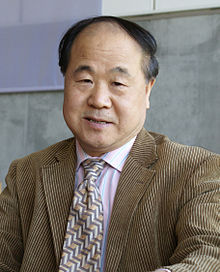This article's "criticism" or "controversy" section may compromise the article's neutrality. (October 2024) |
Mo Yan | |
|---|---|
 Mo Yan in 2008 | |
| Native name | 莫言 |
| Born | Guan Moye (管谟业) 17 February 1955 Gaomi, Shandong, China |
| Pen name | Mo Yan |
| Occupation | Writer, teacher |
| Language | Chinese |
| Nationality | Chinese |
| Education | Beijing Normal University People's Liberation Army Arts College |
| Period | Contemporary |
| Literary movement | Magical realism |
| Years active | 1981–present |
| Notable works | Red Sorghum Clan, The Republic of Wine, Life and Death Are Wearing Me Out |
| Notable awards | Nobel Prize in Literature 2012 |
| Spouse |
Du Qinlan (杜勤兰) (m. 1979) |
| Children | Guan Xiaoxiao (管笑笑) (Born in 1981) |
Guan Moye (simplified Chinese: 管谟业; traditional Chinese: 管謨業; pinyin: Guǎn Móyè; born 5 March 1955[1]), better known by the pen name Mo Yan (/moʊ jɛn/, Chinese: 莫言; pinyin: Mò Yán), is a Chinese novelist and short story writer. Donald Morrison of U.S. news magazine TIME referred to him as "one of the most famous, oft-banned and widely pirated of all Chinese writers",[2] and Jim Leach called him the Chinese answer to Franz Kafka or Joseph Heller.[3] He is best known to Western readers for his 1986 novel Red Sorghum, the first two parts of which were adapted into the Golden Bear-winning film Red Sorghum (1988).[4]
Mo won the 2005 International Nonino Prize in Italy. In 2009, he was the first recipient of the University of Oklahoma's Newman Prize for Chinese Literature.[5] In 2012, Mo was awarded the Nobel Prize in Literature for his work as a writer "who with hallucinatory realism merges folk tales, history and the contemporary".[6][7]
- ^ "Mo Yan". Britannica. 1 March 2024. Retrieved 3 March 2024.
- ^ Cite error: The named reference
Holding Up Half The Skywas invoked but never defined (see the help page). - ^ Cite error: The named reference
Leachwas invoked but never defined (see the help page). - ^ Inge, M. Thomas (1990). "Mo Yan and William Faulkner: Influences and Confluences". Faulkner Journal. 6 (1): 15–24. ISSN 0884-2949. JSTOR 24907667.
- ^ Ding, Rongrong; Wang, Lixun (4 May 2017). "Mo Yan's style in using colour expressions and Goldblatt's translation strategies: a corpus-based study". Asia Pacific Translation and Intercultural Studies. 4 (2): 117–131. doi:10.1080/23306343.2017.1331389. ISSN 2330-6343.
- ^ Cite error: The named reference
Mo Yan får Nobelpriset i litteratur 2012was invoked but never defined (see the help page). - ^ Cite error: The named reference
Nobelwas invoked but never defined (see the help page).